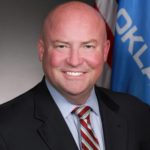By Oklahoma Institute for Child Advocacy CEO Joe Dorman
This week, I want to write about some of the great ideas for children being considered by Oklahoma’s representatives and senators. The job of a lawmaker is often tough; fortunately, there are many advocates and activists who are experts in their respective fields who provide input and ideas.
It is the job of the Oklahoma Institute for Child Advocacy (OICA) to offer data-driven suggestions on policy to help lawmakers make good decisions on the best path for state government to help children. OICA is watching 200 bills with potential impacts on children still alive for the 2021 session.
Senate Bill 339 by Sens. Roland Pederson, R-Burlington, and Sen. Carri Hicks, D-Oklahoma City, and Rep. Ross Ford, R-Broken Arrow, would correct an omission made in state law a few years ago that reduced the age of mandatory seat belt usage for young children. Previously, children 12 and under were required to be buckled in, but a change in the law – a mistake, really – lowered that age to 8.
We all know the data show seat belts save lives. OICA strongly supports the bill and hopes the Legislature will send this bill to Governor Stitt for his signature.
House Bill 1709 by Rep. Brian Hill, R-Mustang, and Sen. Paul Rosino, R-Oklahoma City, is called “The Successful Adulthood Act.” The bill would allow those in foster care on their 16th birthday to be eligible for services until the age of 21. This prevents a situation where children are callously dropped from services on their 18th birthday, putting them at risk of homelessness and incarceration and the bill would be funded by recently passed federal dollars.
House Bill 1773 by Rep. Sherrie Conley, R-Newcastle, and Sen. Jessica Garvin, R-Duncan, is trauma-related legislation that would help students with behavioral issues. This bill requires certain teacher candidates to study Multi-Tiered Systems of Support (MTSS) in the teacher preparation program. MTSS is designed to address the core academic and nonacademic needs of all students.
OICA has been working for several years to help establish policies and training to reduce Adverse Childhood Experiences (ACEs) with young Oklahomans. These traumatic events can lead to adult health issues when left untreated by elimination of the long-lasting trauma and counseling on how to address the situation. HB 1773 would help provide needed counseling by increasing availability across the state.
Rep. Trish Ranson, D-Stillwater, and Sen. Brenda Stanley, R-Midwest City, wrote House Bill 1027, requiring schools to develop and offer violence de-escalation programs. With the growing strain from the pandemic, bullying, home-life issues, and other stressors, HB 1027 outlines how to prevent bad situations from becoming worse.
House Bill 1104 by Rep. Mark Vancuren, R-Owasso, and Sen. John Michael Montgomery, R-Lawton, would include the collection of tribal affiliation-related student data to the Student Data Accessibility, Transparency and Accountability Act of 2013. Schools could seek grants based upon tribal enrollment, accessing more federal funding to which it is entitled.
While we focused this week on good ideas going through the Legislature, not every bill would have a positive impact for children. Next week, I will review ideas that need some work to make each of them a better policy.
Thank you to these lawmakers, and the many others who work to improve the lives of Oklahoma’s children. Working together, policymakers and advocates can help improve conditions in our state and provide for better future outcomes for our youth.


